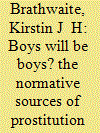| Srl | Item |
| 1 |
ID:
152710


|
|
|
|
|
| Summary/Abstract |
How do militaries decide policies regarding sex and sexual behavior? Are policies based on expert knowledge and correlated to military effectiveness? Is civilian intervention important in crafting military policies? This paper focuses on one specific type of military policy—that governing prostitution. It asks why militaries adopt particular policies regarding the use of prostitutes by their members. Examining two cases of professional militaries at war—Germany and the United States during World War II—it argues that professional military leaders came to different positions on prostitution based on intersecting gender, racial, and political norms in civilian society. The two militaries differed on policy not due to civilian intervention but rather as a result of different assessments of the influence of prostitution on military effectiveness. Those assessments of effectiveness were informed by the racial, gender, and political norms that permeated all of society, including the military.
|
|
|
|
|
|
|
|
|
|
|
|
|
|
|
|
| 2 |
ID:
157985


|
|
|
|
|
| Summary/Abstract |
How do we understand combat effectiveness – soldiers’ performance in battle? Despite the broad consensus that understanding combat effectiveness is important both for scholars and policymakers, there is widespread disagreement about what combat effectiveness is. More specifically, studies of effectiveness tend to focus on either the skill of soldiers in battle, or their will to fight. Yet both skill and will are essential components of an effective fighting force. This article argues that understanding combat effectiveness requires understanding both of these key components of effectiveness. In other words, combat effectiveness requires both the skill and will to engage the enemy in an organized manner. It then demonstrates the usefulness of this conceptualization by applying it to the cases of British, Indian, and Australian forces fighting the Japanese during the Second World War. Only when scholars are talking about the same concept will our understanding of the conditions under which militaries are effective in battle progress. By comparing different units fighting the same opponent under the same material conditions, I demonstrate that units vary both in their combat skill and their will to fight, and that understanding their effectiveness in battle requires analyzing both of these key factors.
|
|
|
|
|
|
|
|
|
|
|
|
|
|
|
|